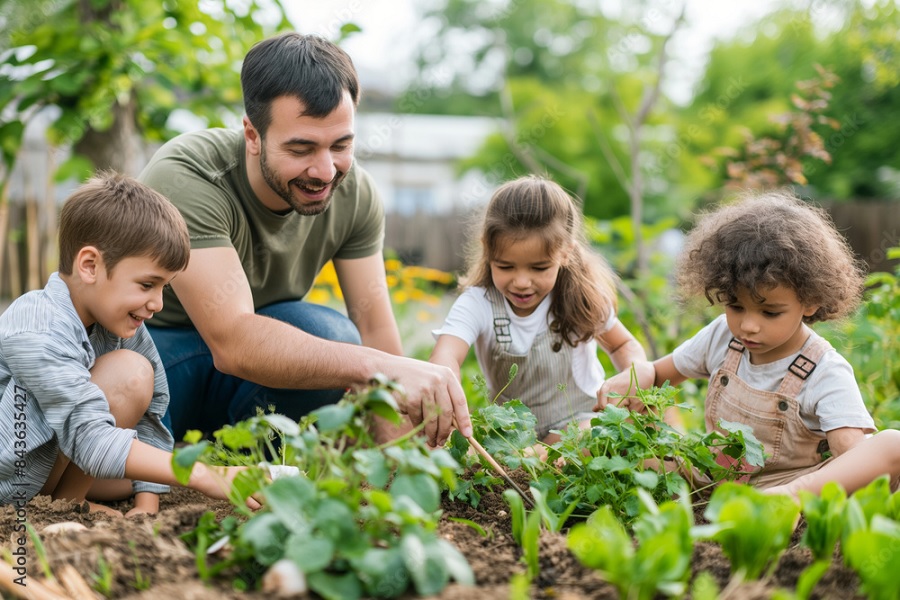The Health Benefits of Gardening: Growing Your Own Food for Better Living

In recent years, gardening has evolved from a hobby to a holistic practice that promotes physical, mental, and emotional well-being. Whether it's tending to a few potted plants on a balcony or cultivating an entire vegetable garden in the backyard, the act of gardening offers a variety of health benefits that can improve your quality of life.
Physical Health Benefits
Increased Physical Activity Gardening is a low-impact form of exercise that encourages movement through various activities such as digging, planting, weeding, and watering. These tasks help improve cardiovascular health, strengthen muscles, and enhance overall flexibility. According to studies, gardening can burn as many calories as walking or doing light aerobics, making it an excellent way to stay active without the strain of high-intensity workouts.
Improved Nutrition Growing your own fruits, vegetables, and herbs not only provides access to fresh and nutritious food but also encourages healthier eating habits. Having a garden stocked with homegrown produce makes it easier to incorporate more fruits and vegetables into your daily meals, promoting a balanced diet rich in vitamins, minerals, and antioxidants. Additionally, homegrown foods are often free from pesticides and chemicals, ensuring that what you eat is pure and safe.
Better Immune System Spending time in the garden can expose you to beneficial bacteria and microorganisms that help strengthen your immune system. Research has shown that the dirt contains soil microbes that, when in contact with the skin, can boost the production of serotonin, a neurotransmitter that influences mood and overall well-being. This can help reduce the risk of certain illnesses and infections.
Mental Health Benefits
Stress Reduction Gardening has long been associated with stress relief. The repetitive nature of gardening tasks, such as raking leaves or watering plants, can have a meditative effect that calms the mind. Studies show that spending time in nature, even for short periods, can significantly reduce cortisol levels (the stress hormone), leading to a decrease in anxiety and a greater sense of peace.
Enhanced Mood Gardening also has a positive impact on mental health by promoting a sense of accomplishment and satisfaction. Watching your plants grow, bloom, and thrive can provide a sense of purpose and boost self-esteem. Additionally, exposure to natural sunlight helps the body produce vitamin D, which is linked to improved mood and mental clarity.
Cognitive Benefits For older adults, gardening can be an effective way to maintain cognitive function and reduce the risk of conditions like dementia. The focus and attention required when gardening stimulate the brain, while the physical activity involved helps improve coordination and fine motor skills. Gardening can also foster social connections, especially for those who participate in community gardens, which can combat loneliness and provide opportunities for socialization.
Emotional Well-Being
Connection to Nature Gardening fosters a deep connection to the natural world, encouraging mindfulness and a sense of belonging. As you care for plants, you develop an appreciation for the cycles of nature, from planting seeds to harvesting the fruits of your labor. This sense of connection can be particularly grounding in a fast-paced, technology-driven world.
Therapeutic Effects Many people find gardening to be a form of therapy. Horticultural therapy is increasingly being used to treat conditions such as depression, PTSD, and anxiety. The act of nurturing living things can provide comfort and offer a therapeutic outlet for those dealing with emotional challenges.
Gardening for All Ages
Gardening is a versatile activity that can be enjoyed by people of all ages. For children, gardening can help develop a sense of responsibility and teach them about nature and healthy eating. For seniors, gardening can provide a gentle form of exercise that is both enjoyable and beneficial for maintaining mobility and mental health. It can also be adapted for people with disabilities, with raised beds or container gardens that make it accessible to everyone.
Conclusion
Gardening is more than just a way to beautify your home or grow food—it's a lifestyle that nurtures both body and mind. By embracing gardening as part of your daily routine, you can improve your physical fitness, boost your mental health, and cultivate a deeper connection with nature. Whether you're an experienced gardener or just starting out, the health benefits are undeniable. So, pick up that trowel, start planting, and watch your health flourish.
























